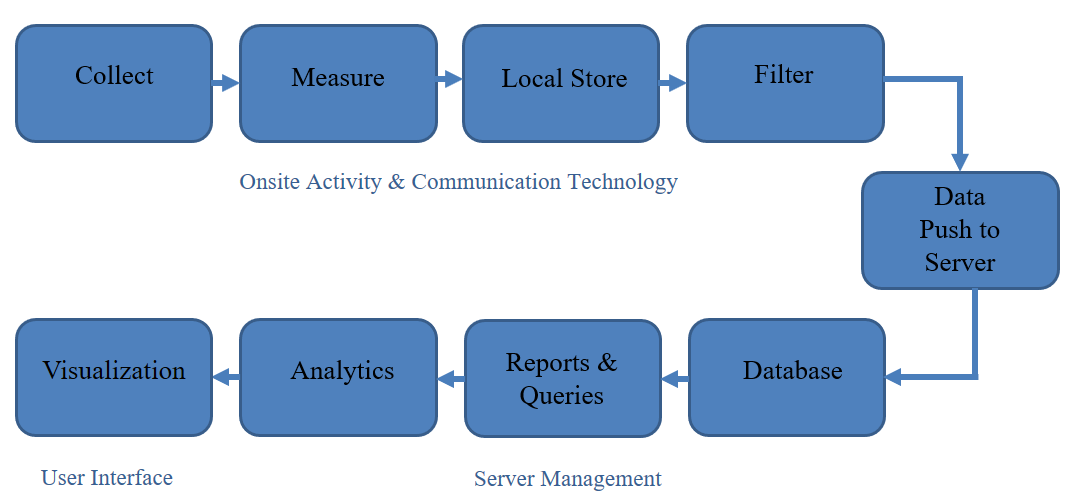Role of Digitization in Solar Industry
Remote Monitoring: Digitization allows for remote monitoring of solar power systems, including solar panels, inverters, and battery storage. This remote access provides real-time insights into system performance and allows for quick detection and response to issues, reducing downtime and maximizing energy production.
Data Analysis: Digital technologies enable the collection and analysis of vast amounts of data from solar installations. This data can be used to optimize system performance, predict maintenance needs, and make informed decisions about system expansion or upgrades.
Energy Management: Digitization enables the integration of solar power systems with energy management platforms. This integration allows for the efficient distribution of solar energy, energy storage, and grid interaction, reducing electricity costs and increasing self-consumption.
Grid Integration: Digitization facilitates the integration of solar power systems with the electrical grid. Smart inverters and grid management systems can ensure stable grid operation while maximizing the use of solar energy.
- Importance of Data Loggers
- Data Logger in Solar Industry
- Where is a Data Logger used for?
- Benefits of a Data Logger in solar power plant
Data loggers are essential components in the digitization of solar power systems for several reasons:
As the solar industry continues its rapid expansion, it becomes increasingly crucial to maximize generation output and maintain high uptime for solar power plants. To achieve this objective, the digitization of processes from the ground up is imperative. This digital transformation enables the minimization of downtime, enhances asset reliability, and ensures optimal long-term performance. In this series of posts, we will explore the pivotal role of digitization within the solar energy sector, highlighting the latest advancements and breakthroughs in renewable technologies. Today, our focus lies on the functionalities and practical applications of data loggers in on-site solar power plants.
A data logger is a sophisticated electronic device designed to systematically record and store data over a specific period, commonly referred to as data logging. In the context of the solar industry, data loggers play a crucial role in capturing and collecting field data related to solar parameters from various sources such as inverters, sensors, meters, or external instruments. These data loggers accurately measure and store the collected information locally within their storage systems.
Reputable data logger manufacturers like SuryaLogix typically offer expandable data storage capacities of up to 500GB. The stored data is subjected to filtering based on various parameters before being transmitted to a server through different methods such as JSON, FTP, MQTT, or API (Rest API), where it is stored in the server's database. This enables users to generate diverse reports, perform queries, and conduct analytical assessments on the data.
The user interface or data visualization component serves as the final stage in the data logger's functionality. It allows users to interact with and interpret the captured data through intuitive representations and graphical displays. The accompanying image below provides a visual aid to enhance comprehension of this concept.

Data loggers find extensive utilization in both commercial and industrial solar power plants, as well as residential solar power plants, to capture and record various data points pertaining to solar assets. These data points encompass critical information such as daily generation, monthly generation, and inverter data, among others.
Data loggers can establish connectivity with servers either through wired or wireless means, facilitating the seamless transmission of measurement results. This enables more effective analysis and optimization of output for solar power plants.
A solar data logger fulfils the essential function of energy monitoring, enabling it to gather data from smart power meters (MFM), diverse sensors, and solar inverters. It is equipped to perform remote monitoring and data collection by leveraging SIM/LAN Internet connections. Furthermore, a data logger possesses the capability to concurrently record real-time voltage, current, power, and energy values associated with PV solar panels, inverters, meters, and other interconnected devices.
For reference, snapshots of the SuryaLogix portal are provided below. To gain a comprehensive understanding of the portal's functionalities, you may connect with the SuryaLogix team and request a free demonstration.

Data loggers offer numerous advantages that are highly beneficial in the solar industry. Firstly, they eliminate the need to deploy personnel to remote locations for monitoring solar power plants, saving both time and expenses. Instead, data loggers enable remote data collection and monitoring, ensuring efficient management without the requirement for on-site presence.
Furthermore, data loggers facilitate the acquisition of a significantly higher data density compared to manual recording methods. This higher data density results in the generation of high-quality data, allowing for more accurate analysis and decision-making. By capturing multiple data points, data loggers provide actionable insights that can be utilized to optimize the performance and operation of solar power plants.
In summary, the utilization of data loggers in solar power plants offers cost savings, improved data quality, and the ability to obtain actionable information for enhanced operational efficiency.
Some Important Points about Data Logger:
- Easy, repeatable configuration
- Remote and local monitoring system with real-time alerts through emails and messages
- Master-slave communication capability
- Support for both wired and wireless data transmission for multiple buildings or installations
- Competitive cost for residential and commercial solar power plants
- Streamlined installation and maintenance processes
- Robust data acquisition and storage capabilities
Stay tuned for our upcoming post, where we will explore the significance of third-party data loggers in solar power plants. To learn more about how solar energy can contribute to your sustainability goals.
contact us at +91 9527818443 or visit our website at www.suryalogix.com.
